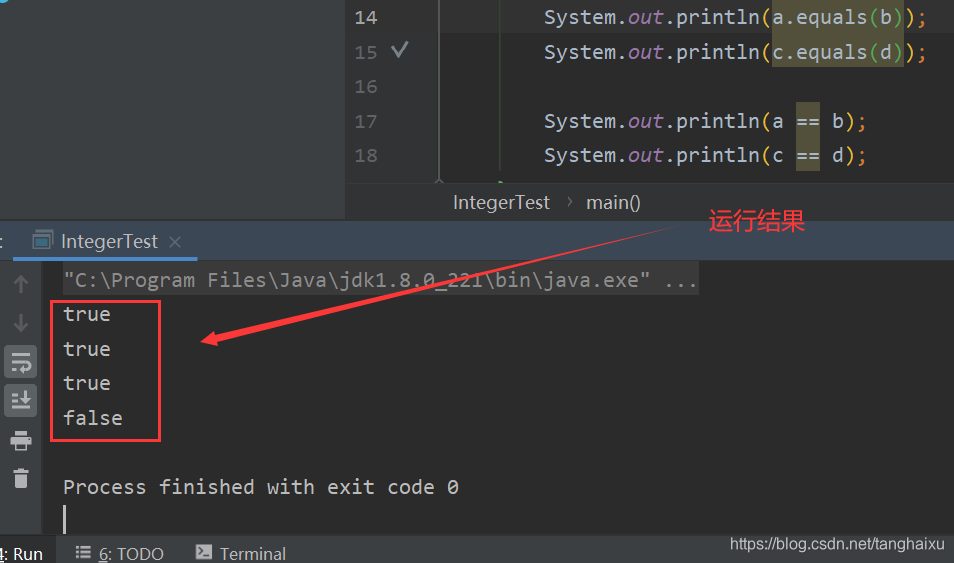Integer类型的数值比较案例分析
Integer是int的的包装类,在Java5之后,可以进行自动装箱和自动拆箱,也就是Integer和int可以进行转换本文以一个Integer类型的数值比较的例题,分析其中一个容易错的点
问题:下面代码中输入的结果为?
package Test01;
/**
* @ClassName IntegerTest
* @Author 长歌
* @Date 2020/5/19 0:19
* @Version 1.0
*/
public class IntegerTest {
public static void main(String[] args) {
//定义4个Integer的对象引用
Integer a = 10, b = 10, c = 200, d = 200;
//引用内容值的比较
System.out.println(a.equals(b));
System.out.println(c.equals(d));
//引用的地址的比较
System.out.println(a == b);
System.out.println(c == d);
}
}
在上面代码中,一眼看过去,可能会觉得结果是两个true和两个false,前面两个比较的是引用内容的值,毫无疑问是true
那么后两个呢?比较的是引用对象的地址,所以都是false吗?
我们都知道上面的 a、b、c、d四个变量都是Integer的对象引用,所有“==”比较的是引用的地址而不是值,按理说,后面两个都是false,但事实上结果是:

可以看出来,除了System.out.println(a == b);的结果出乎意料的是true,其他都是如前面分析一样
那么为什么 a == b为什么为true呢?
我们来看下其中发生了什么,首先,当我们给Integer对象赋一个int值的时候,会调用Integer类的静态方法valueOf(),valueOf源码如下:
public static Integer valueOf(int i) {
assert IntegerCache.high >= 127;
if (i >= IntegerCache.low && i <= IntegerCache.high)
return IntegerCache.cache[i + (-IntegerCache.low)];
return new Integer(i);
}
当IntegerCache.low<=i <=IntegerCache.high时,执行IntegerCache类里面的方法,否则返回new Integer(i),而IntegerCache是Integer的内部类,源码如下:
private static class IntegerCache {
static final int low = -128;
static final int high;
static final Integer cache[];
static {
// high value may be configured by property
int h = 127;
String integerCacheHighPropValue =
sun.misc.VM.getSavedProperty("java.lang.Integer.IntegerCache.high");
if (integerCacheHighPropValue != null) {
int i = parseInt(integerCacheHighPropValue);
i = Math.max(i, 127);
// Maximum array size is Integer.MAX_VALUE
h = Math.min(i, Integer.MAX_VALUE - (-low) -1);
}
high = h;
cache = new Integer[(high - low) + 1];
int j = low;
for(int k = 0; k < cache.length; k++)
cache[k] = new Integer(j++);
}
private IntegerCache() {}
}
概括起来就是,如果int的值在 -128 ~ 127 之间,那么不会new新的Integer对象,而是直接引用常量池中的Integer对象,即引用同一对象,所以 a == b 为true,c == d 为false

